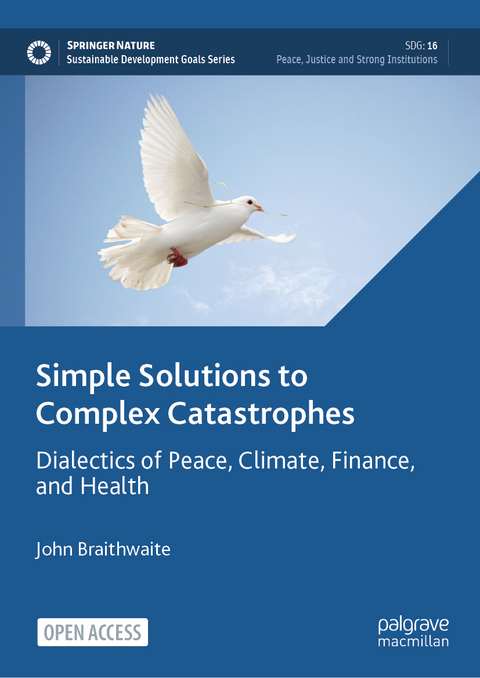
Simple Solutions to Complex Catastrophes
Springer International Publishing (Verlag)
978-3-031-48746-0 (ISBN)
This open access book sets out simple solutions to managing complex catastrophes. It focusses on four kinds of crises - climate change, crime-war cascades, epidemics and financial crises. These catastrophes are conceived as complex and prone to cascade effects. This book is optimistic in explaining that there are identifiable simple institutions that international society can strengthen and some simple principles that can help humankind to control the expanding gamut of complex catastrophes that confront the planet including simple, stable institutions and regulatory bodies. It draws on a wide range of current and past crises and challenges, from the Cold War to COVID-19, and from Weapons of Mass Destruction to restorative diplomacy with States like China, to provide an urgent and timely path forward.
Braithwaite argues that improved peacemaking, and step by step progress toward abolition of Weapons of Mass Destruction helps prevent environmental, pandemic, and financial catastrophes. His method across four kinds of crises is first to prioritize simple principles and simple institutions that prevent coupled catastrophes from cascading one to the other. The next step is to pursue requisite variety in responses by diagnosing dialectically when additional interventions will and will not add value for crisis control. Braithwaite argues that minimal sufficiency of deterrence, responsive regulation of risks, and restorative diplomacy offer superior theoretical foundations than realism in international relations theory and in organizational crime control. It speaks to those interested in criminology, public policy and international relations, political science, sociology, public health and economics.
lt;p>John Braithwaite is Emeritus Distinguished Professor at the Australian National University (ANU), Australia, where he founded the School of Regulation and Global Governance (RegNet). He is a Visiting Research Professor at the University of Maryland. Restorative justice and responsive regulation have been themes of his germinal contributions to global regulatory studies, environmental governance, criminology and peacebuilding.
Preface.- 1. Rapid cascades, coupled crises.- 2. Containment of crises.- 3. Containing states rarely, temporarily.- 4. Institutions to manage threats.- 5. Containing Weapon Systems.- 6. Restorative diplomacy.- 7. Contest political ritualism.- 8. Taking simple institutional virtues seriously.
| Erscheinungsdatum | 29.02.2024 |
|---|---|
| Reihe/Serie | Sustainable Development Goals Series |
| Zusatzinfo | XIV, 436 p. 1 illus. |
| Verlagsort | Cham |
| Sprache | englisch |
| Maße | 148 x 210 mm |
| Themenwelt | Recht / Steuern ► Strafrecht ► Kriminologie |
| Schlagworte | China • climate change • Covid-19 • Diplomacy • famine • Financial Crisis • Global Governance • open access • Pandemic • politics of hope • politics of peace • Regulation • Risk • SDG 16 • States • strong institutions • war • Weapons of Mass Destruction |
| ISBN-10 | 3-031-48746-X / 303148746X |
| ISBN-13 | 978-3-031-48746-0 / 9783031487460 |
| Zustand | Neuware |
| Haben Sie eine Frage zum Produkt? |
aus dem Bereich


